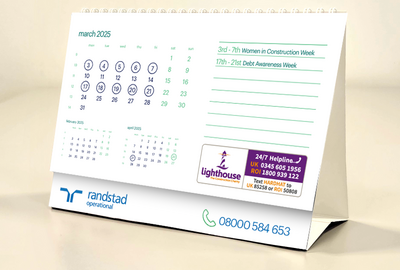- 78% want to go back to the workplace at least partially if not full-time
- 72% declare they will not feel safe in the workplace until others around them are vaccinated
- 87% would be willing to get vaccinated if it's required for their job
A workforce fatigued by restrictions and safety concerns is emerging with a more optimistic and hopeful outlook for the year ahead, according to Randstad’s latest survey of over 27,000 workers in 34 countries.
Research revealed that there is a clear desire for employees to return to the workplace, however not without having the vaccine first.
- For more detailed insight, download the full report below:
strong desire to return to the workplace.
Until a return to work is possible, feelings of isolation, the inability to strike a healthy work-life balance and the longing for personal connections are concerns cited by a majority of workers. Indeed, 52% of Brits mention missing in-person interaction with colleagues, and one in five stated that productivity has been affected negatively due to difficulties associated with working remotely.
These challenges have created a strong desire to return to the workplace by 78% of those polled, however not necessarily in the same way as before the pandemic. 56% of respondents now enjoy a hybrid working environment where they are in charge of choosing their workplace.
Previous research carried out by Randstad also revealed an appetite for workers to return to away-from-home working routines, with an unexpected response to views on commuting and physical meetings. Just one in six (17%) said that they now viewed commuting, business travel and physical meetings as “completely outdated”, while almost half (49%) said the pandemic had not changed their view of commuting or travelling to physical meetings. More than a third (34%) reported missing them.
vaccination rollout boosting business confidence.
For organisations to return to a pre-pandemic state, most survey respondents believe their work environments need to also be much safer than they are now, and an increase in vaccination rollout is seen by many as essential.
72% of UK workers say they won't feel safe in the workplace until others around them are vaccinated (19% higher than the global average), and 63% prefer to work from home until the vaccine is widely distributed.
The global survey also revealed that over a quarter (28%) of workers are required by their employer to be vaccinated. However, an overwhelming majority (87%) of respondents say they would be willing to get vaccinated if required for their job, and two thirds (67%) believe they will have more job opportunities once vaccinated.
Victoria Short, CEO of Randstad UK said: “It’s encouraging to hear that so many are rooting to physically get back to the workplace. It doesn’t come as a surprise however that the majority won’t feel comfortable in a communal environment until they have been vaccinated.
In order to best manage expectations, employers have a key role to play in ensuring robust safety protocols are in place prior to reopening the doors to the wider, non-essential workforce.
While remote working has its benefits, teams are missing out on extra shared learnings, mentoring, spontaneous meetings and ideation sessions which are typically trickier to do virtually. With three in five UK adults now vaccinated and with restrictions lifting, it’s the perfect time to navigate safely back to the workplace, and take advantage of the increasing job opportunities we are seeing as the demand for talent rises.”
career uncertainty.
While the majority believe more opportunities will arise once the population has received a vaccine, 25% of employees fear unemployment because they are on temporary contracts, according to the latest research.
With the furlough scheme set to end in September, 29% fear unemployment once government aid is no longer in place to protect jobs.
In terms of actual job losses, 24% of those surveyed earlier this year have changed jobs because the industry was forced to downsize or close.
Victoria Short said: “UK employers have been fortunate enough to take advantage of the furlough scheme, protecting millions of jobs across the country. Growing anxiety among workers can certainly be justified, as the scheme which supports over four million individuals is set to end on September 30th, as it currently stands. We've noticed some temporary workers fearing loss of income, however our temp worker numbers are now above pre-covid levels, indicating that there are still plenty of opportunities for those who prefer to, or are required to, remain on flexible contracts.”
optimism for the future.
The 2021 survey data revealed that after more than a year of restrictions and lockdowns, the global workforce has grown accustomed to these conditions, and they are more hopeful about the months ahead. While 54% responded that they anticipate a better jobs market globally, a UK audience demonstrates greater confidence in the return to normality, with 61% confident that they will have more job opportunities this year. However, just as they have been adversely affected throughout the pandemic, women are generally less hopeful about the jobs market.
Although optimistic about future job opportunities, 48% of UK respondents say their experience with work during the pandemic has motivated them to stay with their employer for the long term. In fact, a quarter said the experience they've had with their employer during the past year has spurred them to be more productive.
Victoria Short said: "To help instil greater confidence around wellness and safety, leaders need to work on reassuring the workforce that they can take comfort in returning to a workplace that is flexible, and above all, safe. Despite employees putting in more hours working from home, 77% are still satisfied with their job, and we can only expect this number to rise once we return to the workplace or hybrid working environments, which we know the majority desire.”
You can read more detailed insights in the full report which can be downloaded from: https://www.randstad.co.uk/employers/workforce-insights/global-workforce-report/
about the randstad workmonitor
The Randstad Workmonitor was launched in 2003 and now covers 34 markets around the world. The study encompasses Europe, Asia Pacific and the Americas. The Randstad Workmonitor is published twice a year.
In addition to the rotating set of themed questions, the survey also addresses job satisfaction, captures the likelihood of an employee changing jobs within the next six months, and provides a comprehensive understanding of sentiments and trends in the job market.
The study is conducted online among employees aged 18 to 65, working a minimum of 24 hours a week in a paid job (not self-employed). Minimum sample size is 800 interviews per market. The Dynata panel is used for sampling purposes.
The first full survey of 2021 was conducted in 34 markets from February 15 to March 8, 2021.
about randstad
Randstad is the global leader in the HR services industry. We support people and organisations in realising their true potential by combining the power of today's technology with our passion for people. We call it Human Forward. In 2020, we helped nearly two million candidates find a meaningful job with more than 236,000 clients. Furthermore, we trained close to 350,000 people. Randstad is active in 38 markets around the world and has a top-three position in almost half of these. In 2020, Randstad had on average 34,680 corporate employees and generated revenue of € 20.7 billion. Randstad was founded in 1960 and is headquartered in Diemen, the Netherlands. Randstad N.V. is listed on the NYSE Euronext (symbol: RAND.AS). For more information, see www.randstad.com
about randstad UK
Randstad UK helps organisations recruit the best talent and also offers flexible labour resource management and managed service provision (MSP) - enabling companies to streamline processes and reduce costs. It employs 1,500 people, working in 150 locations across the country. Randstad UK is particularly active in the public sector: Randstad Education provides teachers and support staff for schools and colleges, working with 5,000 schools, providing work for over 15,000 teachers and teaching assistants every week; Randstad Care provides nurses, care workers and qualified social workers for the public and private sector, delivering over 2,000,000 hours of care each year. For more information, see www.randstad.co.uk.



